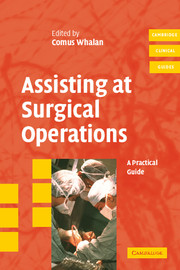Book contents
- Frontmatter
- Contents
- Contributors
- Foreword
- Preface
- PART I Introduction to the operating theatre
- PART II The operation itself
- PART III Assisting at special types of surgery
- 11 Cardiothoracic surgery
- 12 Laparoscopic surgery
- 13 Neurosurgery
- 14 Obstetric and gynaecological surgery
- 15 Ophthalmic surgery
- 16 Orthopaedic surgery
- 17 Otorhinolaryngology-head and neck surgery
- 18 Paediatric surgery
- 19 Plastic surgery and microsurgery
- 20 Surgery in difficult circumstances: (1) Rural hospitals
- 21 Surgery in difficult circumstances: (2) Developing countries
- 22 Vascular surgery: (1) Open surgery
- 23 Vascular surgery: (2) Endovascular surgery
- PART IV Immediately after the operation
- Glossary
- Suggested further reading
- References
- Index
20 - Surgery in difficult circumstances: (1) Rural hospitals
Published online by Cambridge University Press: 18 December 2009
- Frontmatter
- Contents
- Contributors
- Foreword
- Preface
- PART I Introduction to the operating theatre
- PART II The operation itself
- PART III Assisting at special types of surgery
- 11 Cardiothoracic surgery
- 12 Laparoscopic surgery
- 13 Neurosurgery
- 14 Obstetric and gynaecological surgery
- 15 Ophthalmic surgery
- 16 Orthopaedic surgery
- 17 Otorhinolaryngology-head and neck surgery
- 18 Paediatric surgery
- 19 Plastic surgery and microsurgery
- 20 Surgery in difficult circumstances: (1) Rural hospitals
- 21 Surgery in difficult circumstances: (2) Developing countries
- 22 Vascular surgery: (1) Open surgery
- 23 Vascular surgery: (2) Endovascular surgery
- PART IV Immediately after the operation
- Glossary
- Suggested further reading
- References
- Index
Summary
Many rural towns are not big enough to need a full-time resident surgeon, but instead rely on visiting surgeons to provide the necessary expertise for elective cases. Often, the surgeons only stay overnight, and are then on the move again. This arrangement is very common in Australia, due to its sheer size and the widespread distribution of its towns.
In this situation, it is predominantly the general practitioner (GP) who acts as the surgical assistant. In larger towns, the surgical assisting duties may fall to a GP who has a designated interest in surgery, or the duties may be assigned via a roster system. However in many cases, the referring GP will be the surgical assistant. With the current trend of increasing medical undergraduate exposure to the rural environment, most regional centres will have medical students available to act as surgical assistants. While many of the concepts of assisting have been covered elsewhere in the text, there are several points which should be highlighted.
Tips for the GP
If you are new to a particular region or town, introduce yourself to the operating theatre staff. This helps to break the ice and ensure that you are on a good footing with the nursing staff. When introducing yourself to the surgeon, always call them by their correct title to begin with, and then let them tell you, ‘Please call me Bob’, etc.
Punctuality is of the essence as the visiting surgeon is often on a tight schedule, and will not appreciate being kept waiting.
- Type
- Chapter
- Information
- Assisting at Surgical OperationsA Practical Guide, pp. 159 - 160Publisher: Cambridge University PressPrint publication year: 2006

